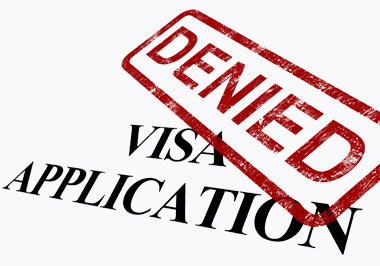Indian visa rejected
Avoid being denied a visa to India by following our practical advice and understand the reasons why.
 Fast: Simplified, efficient process.
Fast: Simplified, efficient process.
 Security: information is protected.
Security: information is protected.
 Reliability: 98% approval rate.
Reliability: 98% approval rate.
 Assistance: 24/7 customer support.
Assistance: 24/7 customer support.


Visas play a crucial role when it comes to travelling to India, allowing travellers to enter the country legally for a variety of reasons, whether for tourism, business, study or other activities. However, it can happen that, despite your best efforts to obtain an Indian visa, your application is denied. This can be disconcerting and discouraging, but it is important to understand that it can happen to even the most prepared traveller.
The purpose of this page is to provide you with valuable advice and information on what to do if you are denied a visa to India. We understand how frustrating this can be, but it's important to remember that there are steps you can take to resolve the situation. We will guide you through the necessary steps and give you suggestions on how best to deal with a visa denied, taking into account the specific reasons for the denial.
e-visa India rejected: in brief
- Understand the reason for the rejected application: Ask the Indian embassy or consulate for details to understand the specific reasons for the refusal.
- Check for errors: Make sure that all the information provided in your application was correct and complete.
- Documents required: Check whether any additional documents were required and have not been provided.
- New application: A new e-visa application may be possible once you have corrected the errors and provided the missing documents.
- Possible appeal: In some cases, an appeal against the rejected decision may be possible.
There are a number of reasons why your application for a visa to India may be denied. Understanding these specific reasons will help you better understand the situation and take the appropriate steps to resolve the problem. Here are some common reasons why an Indian visa may be denied:
It is crucial that you take the time to carefully consider the specific reason for your visa being denied. This will enable you to identify any errors or gaps in your initial application and rectify the situation appropriately. By understanding the reasons for the denied visa, you will be better prepared to take the appropriate steps to resolve the problem and obtain a visa for India.
It is perfectly possible to reapply for an e-visa to India after it has been rejected, but you need to take certain precautions to increase your chances of success.
First of all, it is important to understand the reasons for the rejected application. An e-visa for India can be rejected for a number of reasons, such as incorrect information, a poor-quality photo or an incomplete application. It is therefore essential to check the information submitted carefully before making a new application. If the rejected application is linked to a specific problem, it is advisable to correct the error before submitting a new application.
It is then advisable to wait a certain amount of time before submitting a new application, although there is no official requirement to do so. If you have received notification of a rejected application, the Indian e-visa platform may indicate a reconsideration period or a specific time limit before you try again. It is important to respect this period to avoid being perceived as having attempted to act fraudulently.
Finally, in certain cases, if the refusal is due to a security or admissibility issue (for example, a ban on entry or a problem with the file), it may be more complex to reapply. In this case, contacting the Indian embassy or consulate for personalised advice may be useful.
To sum up, although it is possible to reapply for an India e-visa after it has been rejected, it is crucial to analyse the reasons for the rejection carefully, make the necessary corrections and be patient.
When you are refused a visa for India, it is essential to contact the Indian embassy or consulate directly to obtain precise information about the specific reasons for the refusal. Here are some tips to help you contact the embassy or consulate:
Keeping an open dialogue with the Indian embassy or consulate can be very beneficial, as it allows you to obtain precise information and guidance on how to proceed. They will be able to clarify the reasons for the denied application and guide you through the steps you need to take to rectify the situation.
To avoid having your visa application for India denied, it is essential to take certain precautions and follow the procedures correctly. Here are some useful tips to maximise your chances of success:
Find out if your question has been answered in the list below
If your application for a visa to India is denied, it is important to understand the specific reasons for the refusal. Contact the Indian embassy or consulate for precise information on the reasons for the denied visa and the steps to take. They will be able to guide you on the steps to take, such as submitting additional documents or reviewing your application. Also explore alternative options for travel to India, such as special visa programmes or visa exemptions, which may allow you to go ahead with your trip despite the initial denial.
To avoid having your visa application for India denied, carefully follow the instructions provided by the Indian embassy or consulate. Check that all the required documents are included and complete, be clear about the reasons for your trip, respect the processing deadlines and be honest in your application. Use the online visa application system (e-Visa) to make the process easier.
There is no official time limit for reapplying for an e-visa after it has been rejected, but it is advisable to wait a few days to a few weeks. This allows you to check the reasons for the rejected application and to correct any errors in the initial application. However, if the refusal is due to a question of security or inadmissibility, it is preferable to wait longer and, in some cases, to consult the Indian embassy or consulate before making a new application. In any case, make sure that all the information is correct before submitting the application to minimise the risk of it being rejected again.